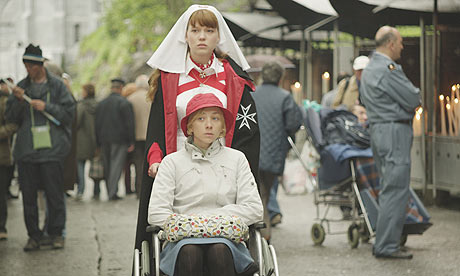
I didn't plan a trip to the cinema. I just popped in to use the loo. Then, out of curiosity, I looked at the board to see what was on. The screening of Lourdes started in two minutes. I'd read a good review the day before and reasoned that it might improve my French. I bought a ticket, handed it to the usher and settled down to watch.
I wasn't in the mood for a film. The advertisements and trailers, which can amuse me if I'm in the right mood, annoyed me with their bright, rapid, manipulative images. Within five minutes of taking my seat, I was regretting my decision. Then the film started.
In less than a minute, I'd relaxed. The opening sequence - people entering a hotel dining room - was sufficient to tell me that I was in the hands of an expert film maker. I don't know quite what it was: the balance of colours, the composition of the frame, the camera angle, the movements of the actors - probably a mixture of all these but more as well. Lourdes isn't a film that offers obvious thrills and dramatic scenery - it's focus is on a small place, a short time-span and a small group of characters. But what is most startling about the film is what it doesn't tell the audience.
Standard Hollywood films construct neat "backstories" for all the characters, which are quickly revealed to the audience. I'm sure the actors in Lourdes knew what their backstories were, but they didn't bother to tell us. We had to observe them in the present tense and make our own guesses and judgements - just as we do when meeting people in real life. There were plenty of questions and mysteries about the characters, who had as much depth as any human beings, but their complexity meant that the puzzles we had couldn't be resolved in the short timespan of a film. I left the cinema still wondering about them.
As director, Jessica Hausner did something unusual - at least in relation to most of the films in British cinemas: she left members of the audience to make up their own minds. And we were left to think on the usual human basis of not knowing everything. I made judgements during the film, because that's what humans do, but I was uneasily aware of how little I knew. Every so often a new fact would be disclosed and I'd be forced to adjust my previous judgement. Most films simplify but Lourdes indicated a complexity that couldn't be resolved prettily in the course of a film.
The setting of the film had been one reason for my hesitation. I've never felt comfortable with the idea of religions offering mass healing to the sick, disabled and unhappy. I worry about those who go and are not healed - some must feel guilty, judged and self-critical because they were not thought worthy of healing. I may be wrong, of course - this is guesswork and imagination. I've also felt uneasy about films of such places and events - I don't want to be a voyeur of other people's hope and misery. Perhaps I'm evading something. It was certainly good to see what a pilgrimage offered to the central character, Christine. Dependent on the help of others, she'd become a connoisseur of pilgrimages, which were her best chance to see the world though, as she explained, she preferred cultural trips.
There were moments when the film did, quite rightly, make me feel uncomfortably voyeuristic. Pain and unhappiness are intimate subjects and the film was so close to life that I felt uneasy at seeing so much. But at times I also saw the pilgrimage from Christine's level, though not through her eyes, and became aware of the discomfort of forced dependency and casual, thoughtless cruelties.
The film has, I discovered later, divided audiences. Some think it favours religion while others condemn it as atheistic propaganda. I don't think it sets out change people's views but it might uncover their doubts. It seems to me that it's a grown-up film that expects an audience of thoughtful adults - it explores a situation without telling people what to think. As a result, I've been thinking about it ever since.

2 comments:
I enjoyed this film too, and found it very moving. At one level, it was an examiniation of attitudes to illness, and to celebrity (as the lead character briefly becomes one). I don't know much about film-making, but it seemed that the camera resting for a long time on a single shot which slowed the pace down, was a feature of this film, and made it different to the fast-cut Hollywood movie.
I didn't feel voyeuristic. Mainly because I could tell myself that the film was fiction (as far as I know).
I did feel it was great to sit through. I liked the main character Christine.
The only message I picked up so far (however, I'll be like you and start thinking late into the night about it) was that when Christine was showing signs of recovery, others started become angry and jealous. Feelings that, according to certain guidelines connected to their faith, shouldn't be tapped.
I am eager to know what happened to Christine at the end - however you could probably guess what happened when the credits started rolling.
Maybe I should revisit Lourdes. For such a bundles of complex ideas, it's simply told. Meaning Jessica Hausner has extreme skill.
If anything else comes to my head, I'll let you know.
Post a Comment